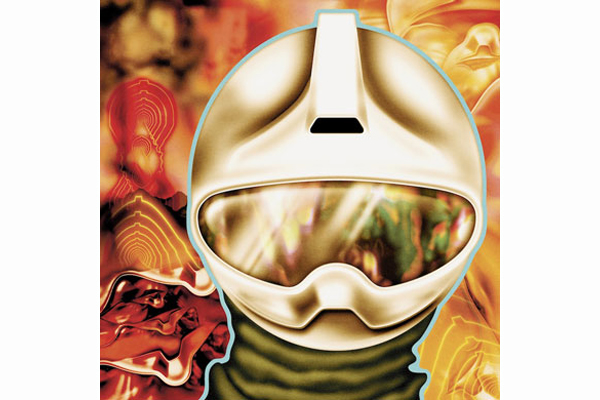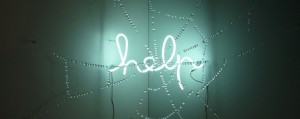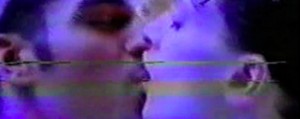You might not think it to talk to him but Gary War (aka Greg Dalton) is an idealist. Sure, the themes for his latest release Thousand Yard Stare, out July 24 on John Elliot-curated Editions Mego sub-label Spectrum Spools, are what you’d call depressing, morose even. But underlying a sentiment best summarised in the lyrics of ‘Thousand Yard Stare’ –“life’s fucked, then you live a little more” –there’s a strongly principled undercurrent driving Dalton’s world view, not to mention a powerful sense of humour.

As antidote to life’s setbacks, if it’s not tracks like ‘Advancements in Disgust’ -bouncing along a cheery synth-line that obscures words like, “there’s no point left” -it’s the twitchy excitement of ‘Careless’ -with its declarations of “I’m losing my fucking mind” buried under effects and distortion -that reveals the bitterly deadpan grin underlying Dalton’s music. Yet, at the face of it, it’s hard to see what there is to be all that bitter about.
In his 30s and working around his core passion between a bar and freelance sound engineering, Dalton is one of the lesser known, though equally prolific, associates of the Ariel Pink fold. Along with weird disco synth-man, John Maus, he’s an original member of what would become Pink’s Haunted Graffiti and he still counts them both as friends. There have been a handful of albums and EPs, a joint venture with Infinity Window-member, Taylor Richardson, as Human Teenager and moves from his hometown of Gloucester, Massachussetts to LA, then New York and back again.
Now, splitting his time between Massacussetts and the Big Apple, Dalton takes the time to chat about his work and what pisses him off about modern like but it’s a meeting that hasn’t come easy. Following several back-and-forths and a cancellation resulting from some bad news received not long before a scheduled appointment, Dalton admits to not being in the best state of mind for an interview. But it’s almost just as well, because –apart from the fact that people are rarely more honest than when they’re angry –’down and out’ is a mood that’s probably not far off from the Gary War oeuvre.

aqnb: You’ve said before that you like the idea of being an outsider, in terms of staying truly underground, instead of allowing subculture to be coopted and commercialised like it so often does.
Greg Dalton: Yeah, absolutely. That’s a big beef with me. This is going to sound negative but I don’t really care what anybody says or thinks about what me and my friends are doing. I have no interest in reading about myself and hating myself more than I do for something I’m just trying to make that’s honest. I’m not going to exploit that and I think it’s disgusting to see a bunch of people and friends act in this sort of way. It’s just gross. But then everyone can do whatever they want.
aqnb: It’s interesting because it’s kind of like this weird cycle. Yes, cultural appropriation does happen but at the same time what about things like The Beatles or Nirvana? They were all capitalised upon but they still made valid work. It seems like a system you can’t really avoid.
GD: That’s true, yeah. And when we you try to think about changing that, the bottom line is that it always wins out, doesn’t it?
aqnb: Yeah but at the same time, you have to buy food and pay rent so why shouldn’t you be renumerated for your work?
GD: Absolutely but I have a different job so, with this, I can be as honest as I want with the stuff that I’m making. I don’t have to worry about what people think about it and I can do exactly what I want because I’m not financially reliant on a project. That’s why I can essentially follow exactly what my –quote, unquote –‘vision’ would be… and that’s how I’ve kept it.
aqnb: From what I can tell, lyrics are especially important to you, yet you’ve buried them in the mix in Jared’s Lot.
GD: Yeah, that’s the way I envisioned it but that’s why I absolutely made sure to print the lyrics of this recent album, regardless of how morose or horrid they are. That’s all part of it. I’m not trying to hide anything with any of this shit because I’m not just gargling away at nonsense. I’m talking about specific things.
aqnb: Are there any themes you can tell me about now?
GD: Well, they’re pretty self-explanatory. Essentially, they’re supposed to be darkly funny but, at a glance, they’re just downright a bummer.
aqnb: The album is quite frenetic. Being in your 30s now and having presumably experienced a pre-internet age, do you think that the web has had an impact on your work?
GD: Absolutely not. I didn’t have it where I was living until this year, really. The reason this album took so long was because I was trying to, basically, take my time and make an eclectic album; make the songs as different as possible. What I did was try new experiments for each song and make the album as varied as possible, as opposed to previous periods.
aqnb: Were you using computer software with the previous records?
GD: Not so much as on this recent one. At the end I would mix down to stereo on computers but I would always just mix by hand on either a reel-to-reel machine or a tape machine of some sort. But on this recent one I used the computer quite a bit, with editing and things like that.
aqnb: Do you think that can really change the tone of your sound, being able to visualise what you’re doing, rather than experiencing it purely sonically?
GD: I can see how that can happen with people, yeah. When I agreed to use software with myself, I made sure to keep the music aural rather than visual. Once I started tinkering around with the screen I would consciously stop because I could see how that could be a problem.
aqnb: There’s been much talk about that element of ‘nostalgia’ surrounding your sound. Is that a description you’d agree with?
GD: When I make this stuff, there’s nothing that I consciously try to do. In fact, I’ll shit-can a bunch of stuff because it sounds like ‘this’ or ‘that’. As far as the nostalgia thing goes… anything with an instrument can be considered nostalgic. Like, ‘oh, here’s a guy with a guitar. He must be doing 50s rock n roll’ or ‘here’s a guy with a sequencer. He must be trying to do Detroit techno. Here’s a guy with an acoustic guitar. He must be from 1910’.
That whole argument with nostalgia, I understand why people or –quote, unquote –‘journalists’ will reference that because they need to identify something or they need to not get tricked because they’re clever. But from my point of view, I couldn’t give a shit about looking backwards.
I don’t look at the internet because it depresses me, but my buddies or the label will send me reviews and it’s like, ‘80s nostalgia’, ‘jerk off that’ and ‘jerk off this’. I lived through the 80s and I hate them now, as I hated them then. I don’t look back longingly at the 80s or the 60s. I’m just doing these records and I’m trying to combine what I think is good music and hopefully taking it to a different place and modernising it. I couldn’t care less about being nostalgic.
aqnb: Interesting you say that just by picking up a guitar, you’re doing something nostalgic because there’s been this focus on electronic music as being ‘retro-futuristic’, even though the synthesiser is the one instrument that is still evolving. So, essentially, if you’re using a synthesiser, you’re doing straight ‘future music’.
GD: Sure. There are also so many combinations of things you can do with it. Pieces of gear you can blend together and channel together. I don’t think that synthesiser music, electronic music, is nostalgic at all. If anything, it’s always futurist because you’re always combining different types of music, different things together and getting new sounds out of it.
aqnb: From what I can tell, you’re quite committed to maintaining your underground status but would you like to achieve a broader appreciation of your music?
GD: Yeah, absolutely. But at the same time, I’m essentially trying to fulfil what I want to do with music and my only hope is to evolve the work and improve on it in the way that it fits my tastes. I think that’s what every one should want to do; to not want to please anybody else but them selves, as tacky as that sounds.
I’m not too worried about it because it’s not easy music to digest, obviously. It’s not going to ruin my world if I keep making shit 20 or 30 years from now, at the same visibility level. I’ll keep doing it and that’s just how it is. I don’t really question it anymore.
Gary War’s Jared’s Lot was out on Spectrum Spools July 24, 2012.
















